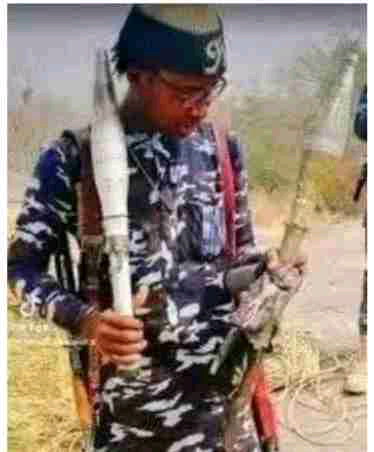Bandit Who Killed Assistant Commissioner of Police Wore His Uniform to Peace Meeting With Katsina Government — Dr. Bashir Kurfi
Dr. Kurfi, who spoke while addressing concerns about the controversial peace engagement, revealed that Jankare not only claimed responsibility for the killing but also openly flaunted the police uniform in areas under his influence
Advertisements
A notorious Katsina bandit leader, Abdurraman Jankare, who is accused of killing an Assistant Commissioner of Police (ACP), reportedly attended a recent peace dialogue with government representatives wearing the slain officer’s uniform, according to Dr. Bashir Kurfi, convener of the Katsina Security Community Initiative.
Dr. Kurfi, who spoke while addressing concerns about the controversial peace engagement, revealed that Jankare not only claimed responsibility for the killing but also openly flaunted the police uniform in areas under his influence. The act, he said, was allegedly celebrated by his followers, further heightening fears among residents and security stakeholders.
Conditions for Peace: ‘No Policeman Should Attend in Uniform’
Kurfi explained that when arrangements were being made for the contentious peace dialogue—footage of which later circulated widely on social media—Jankare and his men issued strict conditions before agreeing to participate. Chief among these conditions was their demand that no policeman attending the meeting should appear in uniform.
Advertisements
The bandits reportedly claimed that the presence of uniformed police officers would provoke hostility and mistrust, insisting that only plain-clothes representatives or government officials should be part of the talks.
According to Kurfi, the circumstances surrounding the peace meeting became even more unsettling when Jankare and his gang issued strict conditions before agreeing to attend. Chief among their demands was that no police officer be present at the meeting in uniform—a request that raised serious questions about the confidence and audacity with which the armed group operates in the region.
Kurfi claimed that despite the sensitivity of the situation, the bandit leader showed up at the dialogue wearing or carrying the ACP’s uniform, the same one taken from the officer he allegedly killed. The move, observers say, was a deliberate show of power and a psychological tactic aimed at intimidating both the government team and local community representatives.
Advertisements
The meeting, which was part of a broader effort to stem the escalating violence in Katsina State, has since sparked widespread debate. Many Nigerians have expressed outrage over what they see as a dangerous precedent: negotiating with heavily armed criminals who continue to operate with impunity.
Security analysts warn that such engagements, while sometimes necessary to de-escalate conflict, must be approached with caution to avoid emboldening criminal groups. The Katsina State government has been exploring non-kinetic methods to complement military operations in the fight against banditry, but critics argue that dialogues with notorious gang leaders often end up strengthening their leverage.
Residents of affected communities remain divided. Some believe the talks offer a temporary pause in hostilities, giving room for humanitarian relief and farming activities. Others fear that granting bandits a platform—especially under conditions dictated by them—could undermine state authority and further endanger security personnel.
The killing of the Assistant Commissioner of Police adds another layer of complexity to the crisis. The slain officer, whose name was not immediately released, was said to have been part of ongoing operations aimed at dismantling camps around Katsina’s troubled areas. His death triggered tension among security operatives and renewed calls for a more decisive approach to the conflict.
Dr. Kurfi emphasized that the Katsina Security Community Initiative remains committed to exploring community-driven solutions but acknowledged the challenges posed by dealing with unpredictable and heavily armed groups. He urged the government to carefully evaluate the outcomes of such meetings and prioritize the safety of all stakeholders involved.
As the state continues to battle persistent attacks, kidnappings, and rural displacement, the controversial peace dialogue has intensified the national conversation around how best to handle negotiations with violent non-state actors. For many, the incident underscores the urgent need for a coordinated, multi-layered strategy that balances security operations, community engagement, and accountability for crimes committed.
Authorities have not yet issued a formal response to Kurfi’s revelations, but pressure is mounting on both state and federal governments to clarify their stance on peace talks with known criminal kingpins—especially one accused of murdering a senior police officer and boldly attending negotiations in the victim’s uniform.
CLICK HERE TO WATCH THE INTERVIEW

